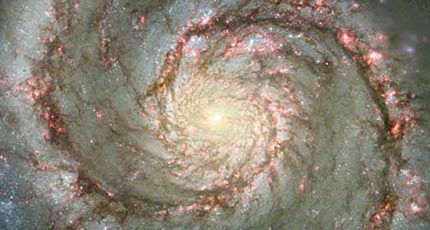That Pesky 96%
—Michael Turner, Cosmologist, University of Chicago

An essay in The New York Times Knowing the Universe in Detail (Except for That Pesky 96 Percent of It) says,
Ordinary atomic matter of the kind that makes up you, me and the stars is 4 percent of the cosmos; dark matter that floats as gravitational glue between the stars and galaxies is 20 percent; and dark energy, which is apparently accelerating the cosmic expansion, pushing the galaxies faster and faster apart, is 76 percent, plus or minus 2 percent.This means that we don't yet understand 96% of what makes up the physical world. That's a big gap in our knowledge. Here's what one should not assume about that gap—it's God.
The reason is that in the 18th century it was popular to insert God as the hypothesis to explain the gaps in our knowledge. For example, Sir Isaac Newton didn't understand certain anomilies in the orbit of planets and so he asserted that God set them back to rights from time to time. Later it turned out that the problem was created by the pull of planets that were yet undiscovered at the time. So rather than God, the answer was Uranus, Neptune and even the now demoted Pluto.
As Diogenes Allen points out,
According to the doctrine of creation, we are never to postulate God as the immediate cause of any regular occurence in nature. In time the "God of the gaps" was seen to be bad science as well as bad theology.So what matters here is that Allen is correct in asserting that sticking God into the gaps of scientific knowledge is bad theology and not just bad science.
Better to let science be science. That mode of inquiry is not best held in check by our spiritual insights with one exception, and that is in the area of ethics. It is perfectly acceptable and appropriate for a person's faith to assist him or her in deciding what advances in science of which behoove they will themselves, such as in end of life care.
But otherwise, we need to let science worry about that pesky 96% of matter we don't even know what is, while we benefit from other scientific advances as we push ahead on our spiritual journeys.
peace,
Frank+
The Rev. Frank Logue, Pastor + King of Peace Episcopal Church
and the truth will set you free."
—John 8:32







2 Comments:
At 10/30/2006 12:13 PM, CS said…
CS said…
I agree. This is precisely why teaching creationism or "intelligent design" in the schools is such an awful idea - it's bad science and muddies the waters between faith and empirical knowledge. We have churches to deal with matters of religion, schools for (among other things) science, and their coexistence detracts from neither.
At 10/30/2006 1:39 PM, Anonymous said…
Anonymous said…
I'm not sure that the subjects can be completely separated for people of faith. For me, the complexities of creation only reinforce that there must be an intelligence behind it all.
I guess what I'm trying to say is that scientists may figure our how it all works, but it doesn't change the fact that God the Creator is still in charge.
Post a Comment
<< Home